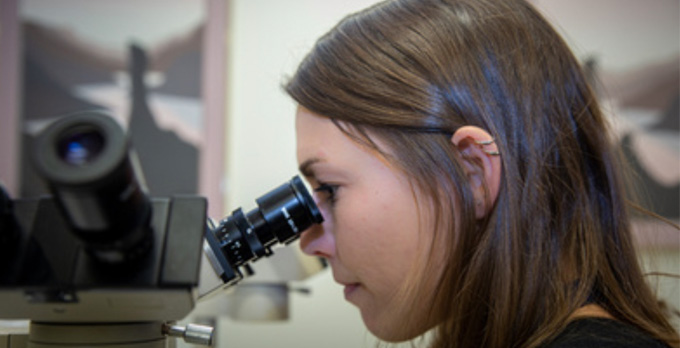This week marks National Forensic Science Week, a time to recognize the contributions of forensic science to the modern criminal justice system and an opportunity to celebrate academic programs, forensic professionals, and scientific research in the various forensic disciplines.
At the intersection of science and justice, forensic science is a wide-reaching field that includes numerous subdisciplines, which may include anthropology, digital sciences, jurisprudence, toxicology, psychiatry and behavioral sciences. At The University of New Mexico, the newly created Division of Forensic Behavioral Sciences, within the Department of Psychiatry and Behavioral Sciences, is the newest academic program dedicated to advancing the field through expanding education, applying theory to practice and developing standards to promote the highest levels of ethics and integrity.

Forensic psychology students are demonstrating how their studies can have a tangible and positive impact on the local community. Through their work, they are not only gaining valuable real-world experience but also contributing to the resolution of criminal cases. By working in tandem with the legal system, they provide critical services to the courts through high-quality forensic mental health assessments to evaluate an individual’s competency to stand trial.
‘The legal and behavioral health systems often overlap, shared Dr. Caroline Bonham, professor and interim director of the Division of Forensic Behavioral Sciences. “We are focused on meeting several important needs in the state, improving interdepartmental and external collaborations, and understanding how social determinants of health impact the intersection of these two systems.”
Hands-On Partnership with Legal Experts Prepares Students for Real-World Challenges
UNM forensic psychology post-doctoral students are gaining unparalleled insights into the world of law through a new mock trial program in collaboration with the UNM School of Law and the New Mexico legal community. By working closely with experienced attorneys and judges, these students are honing their analytical skills, deepening their understanding of the legal system, and preparing for the complexities of real-world forensic psychology practice.
“This hands-on training results in high-quality expert witnesses and improved legal outcomes,” Dean of the UNM School of Law Camille Carey commented. “We are thrilled to collaborate with the Division of Forensic Behavioral Sciences to bring enhanced expertise to courtrooms and justice for clients.”
This program seeks to bridge the gap between theory and practice. Under faculty guidance, students are paired with practicing attorneys, simulating the roles of expert witnesses and psychological consultants in a mock courtroom setting.

“I believe this program offers an invaluable experience for our postdocs," said esteemed former military judge and UNM Professor of Law Joshua Kastenberg, who oversaw the proceedings. "By working alongside seasoned attorneys, they learn to apply their psychological insights within the context of legal proceedings, which is crucial for their future careers."
Through this immersive experience, students not only learn about the legal process but also how their expertise in forensic psychology can influence legal decisions. They collaborate with attorneys to construct psychological profiles of real defendants, analyze witness testimonies from a psychological standpoint, and even provide courtroom testimony under direct- and cross-examination.
“The students certainly bring a new and unique perspective to legal cases,” commented Brenda Saiz, a practicing attorney with Saiz, Chanez, Sherrell + Kaemper and a UNM alumna and adjunct faculty who participated in the mock trial. “Their insights into human behavior and thought processes, as well as the psychological factors that influence decision-making and understanding, add a new dimension to our trial strategies.” She added, “These are talented students that will do an excellent job providing expert testimony and educating both the Court and the juries on their respective topics."
Cases presented during the mock trial involved actual Second Judicial District Court cases and defendants. Forensic psychology students assessed the defendants’ mental states, analyzed any potential contributing factors, and provided expert opinions that would inform the jury's decision-making in the case. "Collaborating with attorneys and defending our psychological assessments in a courtroom-like setting has been both challenging and incredibly rewarding," shared post-doctoral student Unnati Patel, a participant in the mock trial. The intensity of the trial experience pushed the students to think critically and communicate their findings effectively.
The benefits of the mock trial program extend far beyond the immediate trial experience. Participants have noted increased confidence in their ability to communicate complex psychological concepts to a lay audience, a skill that is vital in real-world forensic psychology practice. Additionally, the relationships forged with legal professionals provide valuable networking opportunities and potential avenues for future relationships.
“The mock trial program represents the potential of interdisciplinary collaboration in preparing future professionals to address the intricacies of the legal and psychological landscape,” stated Bonham.
